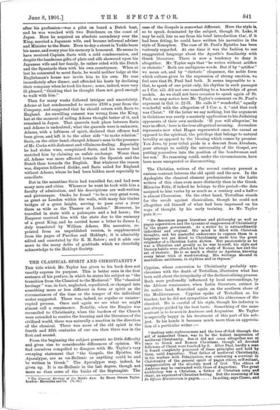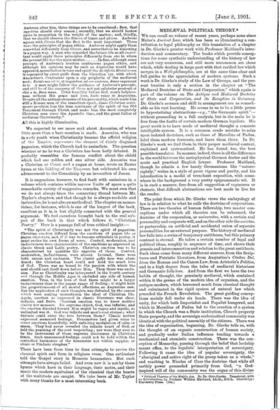THE CLASSICAL SPIRIT AND CHRISTIANITY.*
THE title which Mr. Taylor has given to his book does not exactly express its purpose. This is better seen in the first sentence of his preface, in which be states his subject as "the transition from the Classical to the Medireval." The "classical heritage" was, in fact, neglected, repudiated, or changed into something more or less different in form or spirit as the circumstances of the time or the temper of the individual writer suggested. There was, indeed, no regular or uninter- rupted process. Once and again we see what we might almost call a renaissance. Notably, when the Empire was reconciled to Christianity, when the borders of the Church were extended to receive the learning and the literature of the civilised world, there was naturally a reaction in the direction of the classical. There was more of the old spirit in the fourth and fifth centuries of our era than there was in the first and second.
From the beginning the subject presents no little difficulty and gives rise to considerable differences of opinion. We find ourselves compelled to disagree with Mr. Taylor's very swEeping statement that "the Gospels, the Epistles, the Apocalypse, are as un-Hellenic as anything could be and be written in Greek." The Apocalypse may, indeed, be given up. It is un-Hellenic in the last degree, though not more so than some of the books of the Septuagint. The
• Ths Classical Heritage of the Middle Ages. By Henry Osborn Taylor. London Macmillan and Co. [7s. 6d.1
case of the Gospels is somewhat different. Here the style is, so to speak, dominated by the subject, though St. Luke, it may be said, lets us see from his brief introduction that, if it had been fitting, he could have written his narrative in the style of Xenophon. The case of St. Paul's Epistles has been variously regarded. At one time it was the fashion to use exaggerated language about the Apostle's familiarity with Greek literature. There is now a tendency to deny it altogether. Mr. Taylor says that "he writes without artifice or rhetoric." Both are ambiguous words. But if by " artifice " we mean art, and by " rhetoric " eloquence, the noble form which culture gives to the expression of strong emotion, we feel sure that St. Paul had both. It seems impossible to u that, to speak of one point only, his rhythm in such passages as 1 Cor. xiii. did not owe something to a knowledge of great models. As we shall not have occasion to speak again of St. Paul, we may notice here Mr. Taylor's comment on St. Paul's argument in Gal. iv. 22-31. He calls it "wonderful," equally wonderful with the allegorism of 1 Cor. x. 4, "and that rock was Christ." Of the latter we say nothing, but the argument in Galatians was surely a masterly application to his Judaising opponents of their own methods. 'If you will allegorise,' he says in effect, here is the true allegorical meaning. Jerusalem represents now what Hagar represented once, the carnal as opposed to the spiritual, the privilege that belongs to natural heredity as opposed to the blessing which comes by promise. You Jews, by your tribal pride in a descent from Abraham, your attempt to nullify the universality of the Gospel, are putting yourselves into the position of the bondwoman and her son.' No reasoning could, under the circumstances, have been more unexpected or disconcerting.
The Christian writers of the second century present a curious contrast between the old spirit and the new. In the Apologists the classical element predominates in the Latin writers of this class even more distinctly than in the Greek. Minucius Felix, if indeed he belongs to this period—the date assigned to him varies by as much as a century and a half— is almost Ciceronian. On the other hand, Tertullian stands for the revolt against classicalism, though he could not altogether rid himself of what had been impressed on his ways of thought by his early training. As Mr. Taylor puts it :—
" Re denounces pagan literature and philosophy as well as pagan superstition and the tyrannical suppression of Christianity by the pagan government. As a writer he is extraordinarily individual and original. His mind is filled with Christian thoughts, and his masterful endeavours to express them in a language not yet fitted to Christianity made him the great originator of a Christian Latin diction. But passionately as he VMS a Christian and greatly as he was himself, his style and literary habits were affected by his study of Roman law and the art of rhetoric. He is as much a rhetor as Apuleius, knowing every latest trick of word-twisting. His writings abound in marvellous antitheses, in rhythms and in rhymes."
Cyprian, whose conversion to Christianity probably syn-
chronises with the death of Tertullian, illustrates what has been said about the irregularity of the declassicalising process.
Both were profoundly influenced by local surroundings, by the African renaissance, when Latin literature, extinct in its native land, flourished again on the southern shore of the Mediterranean. Cyprian spoke of Tertullian as his teacher, but he did not sympathise with his abhorrence of the classical. He is careful of his style, though his industry is not always guided by the best taste. Something of the same
contrast is to be seen in Ambrose and Augustine. Mr. Taylor is especially happy in his treatment of this part of his sub-
ject. In his hands it becomes much more than an apprecia- tion of a particular writer :—
" Seeking unto righteousness and the love of God through the aid of unmerited Grace. was to be the holiest inspiration of mediieval Christianity. But it did not come altogether nor at once to Greek and Boman Christians, though all devoted followers of Christ were touched by it. After Paul, hardly a man is found completely possessed of these principles and held by them, until Augustine. That father of mediceval Christianity, in his warfare with Pelagianism. was combating a survival in Christianity of the general spirit of pagan ethics, self-reliant, unappreciative of the absolute need of God. The ethics of Ambrose may be contrasted with those of Augustine. The great archbishop was a Christian, a father of Christian song and chant, an exponent of Christian feeling. But the reasoning of his De Officiis Ministrorum is pagan In acting, says Cicero, and
Ambrose after him, three things are to be considered; first, that appetite's should obey reason ; secondly, that we should bestow pains in proportion to the weight of the matter; and, thirdly, that we should observe the fitness of times and places. Ambrose agrees with Cicero that the first is the most important. These were the principles of pagan ethics. Ambrose might apply them somewhat differently from Cicero, and nevertheless be reasoning in a pagan way. A man who regarded the future life as all-impor- tant would apply these principles differently from one to whom
the present life was the main matter In fine, although some precepts of Ambrose's treatise contravene pagan ethics, and although his opinions may be such as Augustine would have approved, nevertheless in tone and spirit the De Officiis Ministrorum is separated by great gulfs from the Christian cry. with which Augustine's Confessions open, a cry prophetic of the mediteval soul: Pecisti nos ad to, et inquietum est coy nostrum, donee requiescat in te. A man might follow the guidance of Ambrose's precepts, and still he of the company of those not yet salubriter prostrati et dist a is, Deus mew. Utter humility before God, man's helpless- ness without His grace and love, finds voice in Augustine. Despite all the antique elements of his personality, which made him still a Homan man of the transition epoch, these Christian senti- ments proclaim him the true continuer of the spirit of the Old Testament through Christ, and make him the most completely Christian man since the Apostolic time, and the great father of medinival Christianity."
All this is highly illuminative.
We expected to see more said about Ausonius, of whom little more than a bare mention is made. Ausonius, who was in eirly youth when Christianity became the official religion of the Empire, represent" the element of thinly disguised paganism, which the Church had to assimilate. The question whether or no he was a Christian has been hotly debated. It probably resembles the famous conflict about the shield which had one golden and one silver side. Ausonius was a Christian at Court and a pagan at home, wrote an Easter hymn at the bidding of the Emperor, but celebrated his own advancement to the Consulship by an invocation of Janus.
It is ungracious, however, to find fault with omissions in a volume which contains within narrow limits of space a quite remarkable variety of suggestive remarks. We must own that we do not always trace the connecting thread between Mr. Taylor's chapters, and that though he is always readable and instructive, be is not always methodical. The chapter on monas- ticism, for instance, which is one of the longest of the book, excellent as it is, is but slightly connected with the general argument. We feel ourselves brought back to the real sub- ject of the book in that which follows it, "Christian Poetry." Here is a passage full of true critical insight :—
" The spirit of Christianity was not the spirit of paganism. Christian emotion differed from the emotions of pagan life or pagan literature, and, if it. was to become articulate in poetry, it must evolve its own forms of verse. Control, moderation, and inclusiveness were characteristic of the emotions as expressed in classic Greek and Latin poetry. Christian emotion was to be characterised by qualities the opposite of these. Control, moderation, inclusiveness, were absent. Instead, there were both excess and exclusion. The classic ILIA, &yap was aban- doned; the Christian heart could not hold too much love of God. There was no bound to the passion with which the soul should cast itself down before Rim. Then there was exclu- sion. For as Christianity was interpreted in the fourth century and through the Middle Ages it excluded one side of human emotion. True, in the love of God there might be a larger inclusiveness than in the pagan range of feeling ; it might hold the proportionment of all mortal affections, as Augustine saw. But the application of such thoughts was defeated by the causes which were making monasticism the ideal of Christian life. Again, emotion as expressed in classic literature was clear, definite, and finite. Christian emotion was to know neither clarity nor measure. Its supreme object, God, was infinite; and the emotion directed toward Him might be vague and mystic, so unlimited was it. God was infinite and man's soul eternal; what finitude could enter the love between them ? Classic metres expressed measured feelings. Hexameters had given voice to many emotions beautifully. with unfailing modulation of calm or storm. They had never revealed the infinite heart of God, or told the yearning of the soul responding ; nor were they ever to be the instrument of these supreme disclosures in Christian times. Such unmeasured feelings could not be held within the controlled harmonies of the hexameter nor within sapphic or alcaic or Pindaric strophes."
There have been from time to time attempts to revive the classical spirit and form in religious verse. One enthusiast told the Gospel story in Homeric hexameters. But such attempts have always failed. And even now it is not by those hymns which have in their language, their metre, and their music the modern equivalent of the classical that the hearts of the multitude are caught. We take leave of Mr. Taylor with many thanks for a most interesting book.







































 Previous page
Previous page